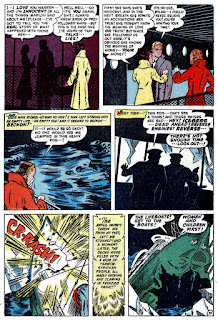Unlike what Bruce Springsteen sings, maybe not
everybody has a hungry heart...but certainly our heroine, Wilma, has that condition. And for Wilma, raised by a hermit-dad in Vermont without neighbors, friends, or lovers, the only thing that will satisfy Wilma’s heart’s appetite is the love of a man.
“Hungry Heart” from
Lovelorn #5 (1950) goes from the story of a naïve young woman going through a couple of gold-digging cads while looking for true love, to a story that is reminiscent of
Titanic. Luckily for the lovers, with a much happier ending.
Gus Ricca gets credit for the artwork.














2 comments:
Well, that was beautifully drawn; it's unfortunate that the printing wasn't of much better quality.
In most of the love-comic stories that we've seen here, the central character fails to recognize Mr or Ms Right, gets involved with Mr or Ms Wrong, and but then discovers each of his or her errors almost simultaneously.
Here, the central character gets involved with two heels, but recognizes each as such before Mr Right comes on the stage. Then her problem is that Mr Right is misled by Ms Wrong. Of course, had Warren been made the central character, this story would have looked more like the usual form, with Wilma being Ms Right and Marilyn being Ms Wrong.
But I think that making Wilma the central character works better, for two reasons. First, given the ordinary form, a large part of her story would become abstracted back-story, leaving her rather a cypher. Second, and more importantly, because she is, viewed objectively, Ms Right, rather than someone who has Ms Right and Ms Wrong confused, Wilma is a more appealing central character.
Now, granted that we have to ask why she's so in love with Warren, given that he quite readily makes such confusions. If one pokes at things, then one might conclude that Warren is yet another Mr Wrong (albeït not a malevolent Mr Wrong). But, that does take a bit of poking, whereäs central characters who run-off with mustachioed sharps after they've already met Mr Right are more obviously flawed. Here, the reader can easily embrace the central character. And I believe that those who are inclined to consume the popular art of romantic love are especially less likely to imagine themselves as failing to recognize Mr or Ms Right, and very likely to believe that, upon one or more occasions, they were themselves Mr or Ms Rights who went unrecognized.
One very false note in this story is the cruise. People of that era would not go on pre-nuptial cruises; they would have flown to England, and any cruise would have been for their honeymoon. But, without the cruise, Wilma couldn't very well have rescued Warren from a sinking ship after Marilyn's desertion. And having Wilma go after Warren on the honeymoon cruise would have been … awkward.
What can I add to your insightful analysis of the story except "well said, Daniel"?
Post a Comment